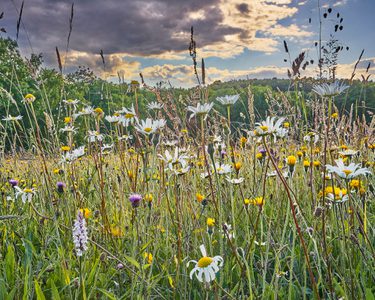A call to save the UK's wild flower meadows

"People tie themselves to trees as the chainsaws arrive, but nobody lies down amongst meadow buttercups in protest at the ploughing up of ancient meadows," writes Dr Trevor Dines, Plantlife Botanical Specialist. Wild flowers including wild strawberry, ragged robin and harebell are declining markedly as a result of the devastation of grasslands including wildflower meadows - 97% of which have been eradicated since the 1930s, says Plantlife, Europe's largest charity dedicated to wildflowers and other flora.
"The steady, quiet, and under-reported decline of our meadows is one of the biggest tragedies in the history of UK nature conservation ... If over 97% of our woodland had been destroyed there'd be a national outcry. There exists a very real threat that we will lose our remaining meadows and the wealth of wildlife they underpin unless we learn to love, cherish and protect them," says Dines.
Traditional meadows and other grassland flowers, many of which were once widespread, that are now on the Near Threatened list in England. These include quaking-grass, harebell, crosswort, wild strawberry, common rockrose, field scabious, hoary plantain, tormentil, ragged robin and devil's bit scabious.
. But the vanishing of our species-rich grassland must be opposed and countered unless we are to slip into a thoroughly nature-depleted landscape where the wilds things are lost, and where the only strawberries children know are those boxed in plastic in the supermarket aisles."
Plantlife said that the decline of these flowers is having a devastating impact on the wildlife they underpin. The steep and steady decline of wild strawberry, field scabious and devil's-bit scabious is particularly concerning as they are the plant food for 51, 26 and 25 species of invertebrates, respectively. A healthy wildflower meadow can host 140 species. Some of our 52 native British orchids of meadows and grassland include the increasingly rare military, monkey and greater butterfly orchids.